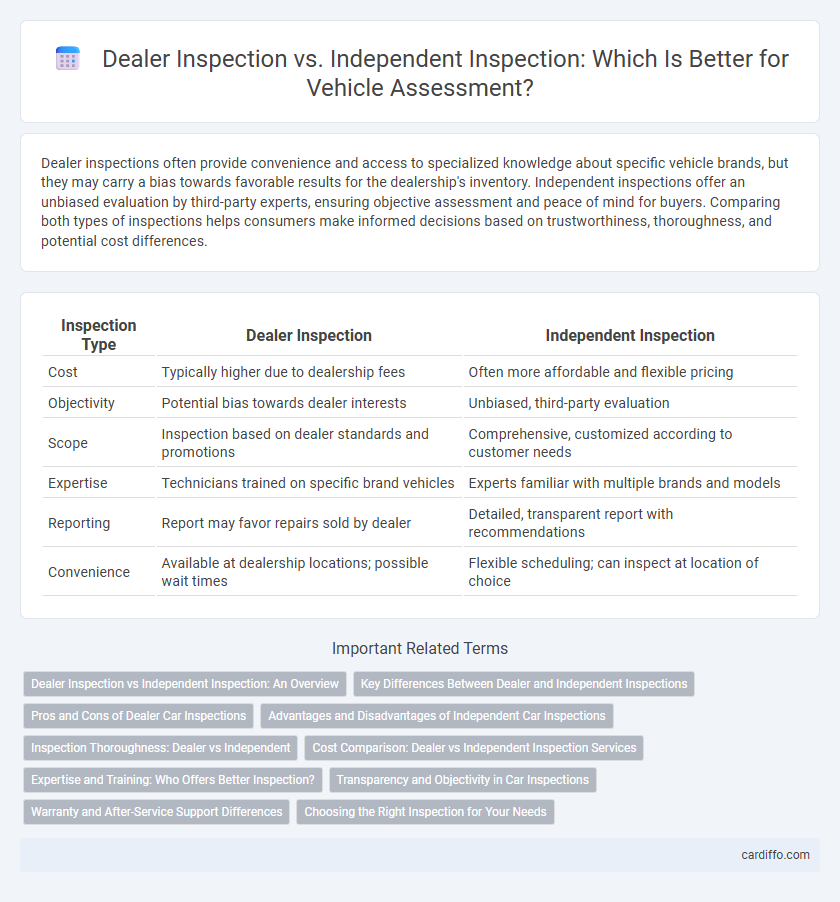Dealer inspections often provide convenience and access to specialized knowledge about specific vehicle brands, but they may carry a bias towards favorable results for the dealership's inventory. Independent inspections offer an unbiased evaluation by third-party experts, ensuring objective assessment and peace of mind for buyers. Comparing both types of inspections helps consumers make informed decisions based on trustworthiness, thoroughness, and potential cost differences.
Table of Comparison
| Inspection Type | Dealer Inspection | Independent Inspection |
|---|---|---|
| Cost | Typically higher due to dealership fees | Often more affordable and flexible pricing |
| Objectivity | Potential bias towards dealer interests | Unbiased, third-party evaluation |
| Scope | Inspection based on dealer standards and promotions | Comprehensive, customized according to customer needs |
| Expertise | Technicians trained on specific brand vehicles | Experts familiar with multiple brands and models |
| Reporting | Report may favor repairs sold by dealer | Detailed, transparent report with recommendations |
| Convenience | Available at dealership locations; possible wait times | Flexible scheduling; can inspect at location of choice |
Dealer Inspection vs Independent Inspection: An Overview
Dealer inspection involves a thorough evaluation conducted by authorized dealership technicians, ensuring adherence to manufacturer standards and use of genuine parts. Independent inspections offer unbiased assessments from third-party experts, often providing more transparent and cost-effective reports but may lack access to proprietary diagnostic tools. Choosing between dealer and independent inspection depends on priorities such as warranty protection, cost, and depth of inspection detail.
Key Differences Between Dealer and Independent Inspections
Dealer inspections often emphasize brand-specific standards and use manufacturer-approved technicians and equipment, ensuring adherence to warranty requirements and OEM guidelines. Independent inspections provide an unbiased evaluation by third-party professionals, offering a more comprehensive overview without brand loyalty, which can reveal hidden issues not covered by dealer assessments. Key differences include cost, with dealer inspections typically being more expensive, and scope, with independent inspections often covering broader vehicle conditions beyond manufacturer criteria.
Pros and Cons of Dealer Car Inspections
Dealer car inspections offer the advantage of certified technicians familiar with specific vehicle brands, ensuring accurate diagnostics and genuine parts replacements. However, dealer inspections often come with higher costs and potential bias toward upselling dealer services or vehicles. Independent inspections provide more objective assessments, usually at a lower price, but may lack access to specialized equipment or manufacturer-specific knowledge.
Advantages and Disadvantages of Independent Car Inspections
Independent car inspections provide an unbiased assessment of vehicle condition, often revealing hidden issues that dealer inspections might overlook due to conflicts of interest. They offer detailed reports from certified technicians, enhancing transparency and buyer confidence but can be more costly and time-consuming compared to dealer inspections. However, their impartiality and thoroughness often outweigh these drawbacks, making them essential for informed purchasing decisions.
Inspection Thoroughness: Dealer vs Independent
Dealer inspections typically follow manufacturer-specific checklists and use specialized diagnostic tools ensuring comprehensive coverage of brand-specific issues. Independent inspections often provide a more flexible approach, focusing on general vehicle condition and potential hidden problems that may be overlooked by dealer-centric protocols. Thoroughness varies as dealers excel in brand-specific details, while independents offer broader, unbiased evaluations.
Cost Comparison: Dealer vs Independent Inspection Services
Dealer inspection services typically cost more due to brand-specific expertise and use of original manufacturer parts, with prices ranging from $150 to $500 on average. Independent inspection services offer more affordable options, often between $75 and $200, while providing thorough evaluations without brand bias. Choosing independent inspections can result in significant savings without compromising the accuracy and quality of vehicle assessment.
Expertise and Training: Who Offers Better Inspection?
Dealer inspections are typically performed by technicians who receive specialized training and certification directly from the vehicle manufacturer, ensuring in-depth knowledge of specific models and brand standards. Independent inspections are conducted by experienced professionals who often have broader expertise across multiple vehicle makes and use a more neutral approach without manufacturer bias. For comprehensive diagnostics and brand-specific insights, dealer inspections offer higher expertise, while independent inspections provide versatility and often a more impartial evaluation.
Transparency and Objectivity in Car Inspections
Dealer inspections often lack transparency due to potential conflicts of interest, as dealers may emphasize positives to facilitate sales. Independent inspections provide greater objectivity by offering unbiased evaluations based on standardized criteria, ensuring accurate condition reports. This transparency and impartiality in independent inspections empower buyers with reliable information for informed decision-making.
Warranty and After-Service Support Differences
Dealer inspections often come with the advantage of comprehensive warranty coverage, as they use manufacturer-approved parts and certified technicians, ensuring any necessary repairs remain covered under the vehicle's existing warranty. Independent inspections may offer more flexible pricing and personalized service but typically do not guarantee warranty preservation since they might use aftermarket parts or non-certified labor. After-service support from dealers tends to be more reliable and integrated with the vehicle's service history, providing seamless warranty claims and maintenance records.
Choosing the Right Inspection for Your Needs
Choosing between dealer inspection and independent inspection depends on your specific needs and priorities. Dealer inspections often provide specialized knowledge of the brand and warranty coverage, while independent inspections offer unbiased, broad assessments across various vehicle makes and models. Evaluating factors such as cost, thoroughness, and expertise helps ensure the inspection aligns with your priorities, whether for purchase assurance or maintenance verification.
Dealer inspection vs independent inspection Infographic

 cardiffo.com
cardiffo.com